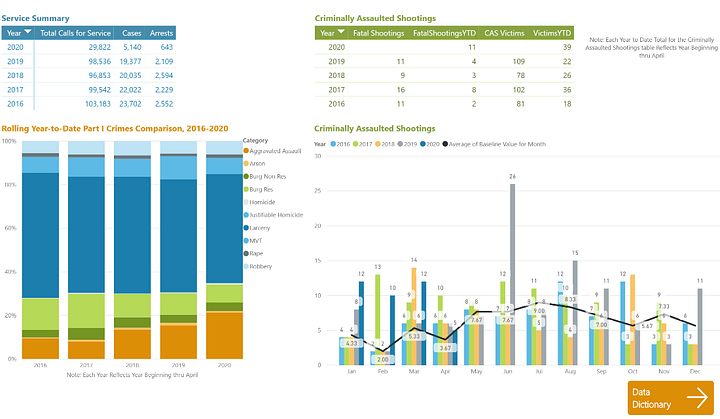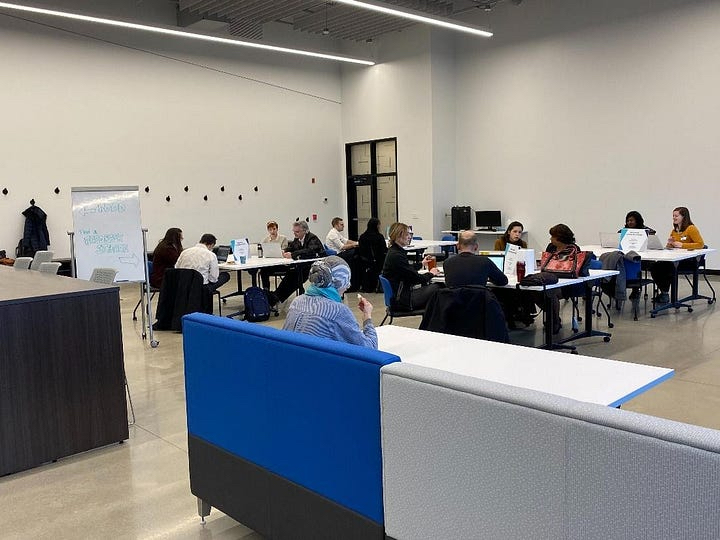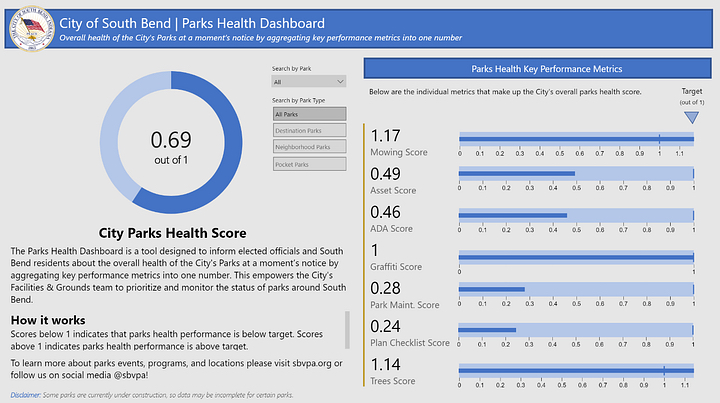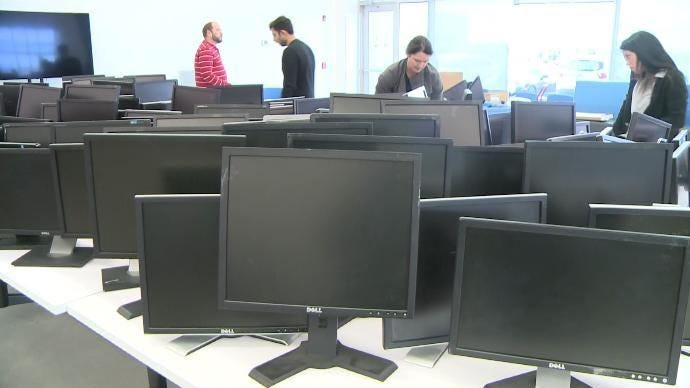South Bend, Indiana, USA
South Bend Charts its Future, One Dashboard at a Time.
Project Type:
Community Engagement, Finance, High-Performing Government, Housing, Parks & Recreation, Public Safety, Technology, Transportation
2023 Gold Certification & 2024 Gold Certification
South Bend, Indiana has been leveraging data and performance management to support its struggling utility customers. First, throughout 2021, the City closely tracked utility payment behavior to understand household vulnerability. The data work justified and contributed to the design of a post-COVD utility bill forgiveness program that impacted 4,957 households. The City also evaluated its existing, monthly Customer Assistance Program (CAP) and discovered two important things: the monthly discount program was burdensome to apply for and was dramatically undersubscribed. To solve the process problem, the City remade the program into the Utility Assistance Program and adopted best practices by shortening the application, testing it with users, and taking away document requirements. To solve the undersubscription problem, the City created a strategic performance management and outreach program called “Assistance Stat” in 2022. Assistant Stat brought together the Mayor’s Office, the Department of Innovation & Technology, neighborhood canvassers, public health workers, and librarians together to track uptake in various undersubscribed government programs and plan data-driven outreach and events.
2020 Silver Certification
Used the Hub data-site details officer recruitment efforts, breaking data down by gender, ethnicity and hiring stage, and links to more information contextualizing the dataset and explaining the overall recruiting process.
To ensure access to affordable and reliable mobility options, outcomes-based procurement strategies were applied to ensure better quality and more effective rideshare services for community employees and residents.
Committing to Data
For decades, South Bend’s national reputation has centered on “the Fighting Irish,” the famed football team of neighboring University of Notre Dame. The reality is that South Bend is far more complex and dynamic than its image as a college town implies.
The city of about 100,000 people is a former manufacturer hub reinventing its economy for the post-industrial age — something two-term mayor and former Presidential candidate Pete Buttigieg liked to note on the campaign trail. And South Bend’s government is also charting a new path for itself. It has led by example in recent years, embracing technology and data-driven practices to spark innovation, engage residents, and improve city services. These new approaches to governance started under Buttigieg and continued under Mayor James Mueller, South Bend’s former Director of Community Investment and Chief of Staff.
As Chief of Staff, Mueller oversaw the launch of a new Department of Innovation & Technology — I&T for short. Over the last four years, the department has provided support to strategic initiatives and internal departments, moving critical projects forward while championing the use of data to improve processes.
“Our Department works across a wide variety of city teams to forward data governance, transparency, process improvement, technology implementation, and analytics,” said Chief Innovation Officer Denise Linn Riedl.
Staffed to serve all city departments, I&T is the centralized office for all things data and technology in South Bend. SBStat, a citywide performance management program, is managed by I&T, along with SB Academy, the government’s internal employee training program for technical skills and leadership. But the department also directly supports things far more visible to South Bend residents — like the police department’s “Transparency Hub.”
“The City of South Bend is committed to data and technology excellence and that was codified with the creation of our Department of Innovation & Technology.”
Boosting Police Transparency
The Hub’s central goal — to gather and share with the public valuable data and information about police operations into one accessible location — aligns perfectly with I&T’s mission. Initially launched in 2017 by I&T and the police department, the Hub features new additions and improvements each year, including a new recruitment and diversity analysis in 2019. Another highlight of the Hub is a dashboard detailing calls for services, shootings and various other crimes.

South Bend policing practices came under heightened scrutiny after Eric Logan, a black resident, was fatally shot by a white officer in June 2019. A community outcry followed and national media outlets covered the story as Buttigieg returned to South Bend from the campaign trail. City residents are looking for greater accountability and transparency, and the Hub is an important part of the police department’s commitment to those values. Looking ahead, the city plans to make greater detailed data on Use of Force and include Group Violence Intervention data publicly available on the Hub. The SBPD and I&T teams are also partnering to work with city residents to make the Hub more interactive and user-friendly.
Of course, data transparency is only one step in the journey of broader reform and improvement. As the entire country has focused on reforms to policing following the death of George Floyd, the City of South Bend has worked to move forward with plans to implement multiple policing reforms, including new discipline policies for the department. The Department of Innovation & Technology spearheaded efforts to collect public input on the latest draft of disciplinary changes, as well as facilitating public feedback on budget decisions for 2021.

Beyond accountability and transparency, the Hub also supports the police department’s civic engagement efforts — including partnering with the Behavioral Insights Team (BIT) to recruit a more diverse officer corps reflective of South Bend’s population. The site details officer recruitment efforts, breaking data down by gender, ethnicity and hiring stage, and links to more information contextualizing the dataset and explaining the overall recruiting process. “We want people from our own backyard to join the team, but we also want people from other areas, with other experiences and ideas, to call South Bend home too,” said Ruszkowski.
Why such a focus on recruiting? The city wants potential officers — especially people of color and women — to become familiar with the application process so they can prepare for the steps in the application process where people most often stumble. As a result of this tracking, the police department has already taken action to improve the process, including reducing the number of police officers at interviews and adding new training resources and events before physical tests.
New Views on Green Space
Another data-driven project I&T has helped make reality involves parks. Aaron Perri, the Executive Director of South Bend’s Venues, Parks, and Arts (VPA) Department, wanted to maintain the city’s parks more strategically and efficiently. VPA partnered with I&T and used SB Stat to identify and track park condition metrics over time.
The result of the partnership was the Parks Health Dashboard, an internal tool which will launch publicly in 2020 and includes maintenance statistics regarding mowing, park assets, tree coverage goals, and graffiti removal. But every park’s performance isn’t measured in the same way — staff decided that parks of different sizes and with different facilities should not be benchmarked in the same way. For example, a larger destination park such as South Bend’s Potawatomi Park, should be mowed every five days, whereas a smaller neighborhood park might need mowing every two weeks. After establishing targeted benchmarks, Parks Department staff discovered they were actually over-mowing many parks.

Using the analyzed data, the department was able to reduce the overall amount of time and money spent on mowing parks. John Martinez, VPA’s Director of Facilities and Grounds, sees the Parks Health Dashboard as a means to track consistent maintenance goals. While these daily goals seem small to most, in reality they add up to long-term savings for the City while maintaining standards for residents.
“The value and impact of maintenance is hard to quantify, because it’s largely not noticed by the public unless it’s in a state of disrepair,” said Martinez.
“The Parks Health Dashboard allows us to directly show the residents the value of our preventative maintenance programs and capture the meaningful work our employees perform in public spaces. It represents the safety inspections, planning, and intentionality we have with managing community assets.”

Martinez has also pointed to the motivational power of data for his team. When a frontline worker sees the dashboard displayed, they see how the bars and numbers change from the beginning of their shift to the end. They can see visually how their daily work contributes to system-wide health for the City’s parks.
Beyond improving operations, morale, and transparency, the Parks Health Dashboard also revealed to staff how their work can improve equity across the city. Staff are not simply maintaining parks that receive the most 311 calls for improvements from residents, they are proactively prioritizing parks maintenance based on a comprehensive set of metrics that assess parks health. This new approach ensures parks health is applied equitably across the city regardless of how affluent a neighborhood is, as 311 data shows 311 is a resource that is more likely to be used by residents that live in affluent neighborhoods.
A Data-Driven Future
Additional improvements are planned for both the police department’s Transparency Hub and the Parks Health Dashboard — and the city is moving forward with other data-driven projects involving financial transparency, public health, and transportation access. When data showed that a lack of reliable transportation was the top barrier to employment for one-third of low-income workers in South Bend, the city acted.
I&T is expanding the Commuters Trust program, which aims to solve transportation challenges using support from a three-year grant from the Bloomberg Philanthropies Mayors Challenge. South Bend piloted the guaranteed-ride program in 2019 with three employers (including the University of Notre Dame) and more than 200 participants. Three-fourths of participants said that guaranteed transportation to and from work prevented them from missing or being late to a shift and allowed them to work more shifts. There was a 29 percent decrease in absences. To ensure access to affordable and reliable mobility options, I&T is applying outcomes-based procurement strategies, with the support from the Government Performance Lab at the Harvard Kennedy School, to ensure better quality and more effective rideshare services for community employees and residents.
The Technology Resource Center, where I&T, Commuters Trust, and the local South Bend Code School work, symbolizes South Bend’s commitment to leveraging data and technology to improve the region and lift up all residents. The 12,500 square-foot facility opened in December 2019 and provides a space where education, government and the private sector can come together to solve problems and grow tech skills, Mayor Mueller said in March. The Center is dedicated to helping everyone learn about technology and data and build an inclusive tech future for South Bend.

“We still have a lot of work to do, but I’m proud of what our team has accomplished in partnership with all city departments,” said CIO Riedl.
“Data continues to shape program design, evaluation, and transparency, but we want to take that a step further and engage residents with the City’s data and put that information in service to them. We hope the TRC and its programming can help accomplish that.”
For updates on the data and technology-related work coming out of South Bend, you can follow the I&T team’s Medium Blog.